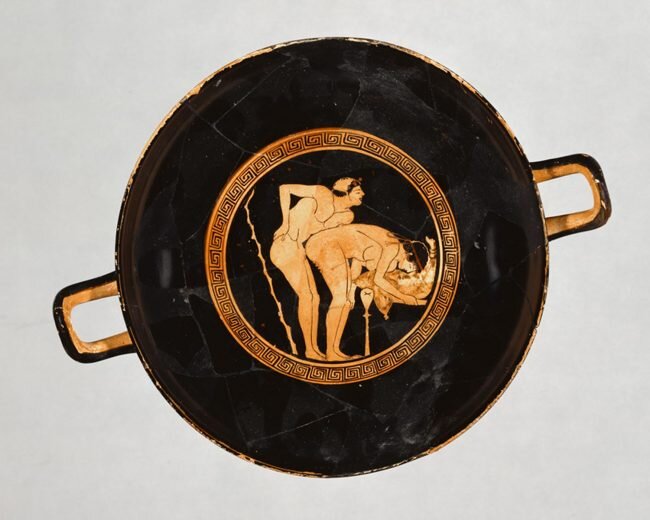Advice on choosing your next partner (derived from Plato’s Phaedrus)
All your prospective partners may be divided into two groups: those who will fall in love with you, if you let them, and those who regard a relationship as an exchange (what Aristotle called an “advantage friendship”) in which the currency is sex.
Thus the question is: from which group should you choose your next partner? The right choice becomes clear from a comparison of the two types. Consider them in turn.
The Lover
Inconstancy is the salient mark of the lover – an inconstancy born of a temperamental volatility rooted in the lover’s insecurity. The lover is preoccupied with whether his love is reciprocated. He is forever weighing up the balance of credits and debits, with an eye to comparing how much he has given with how much he has gotten back.
The lover’s insecurity infects every part of his relationship with you. His passion waxes and wanes between the extremes of mania and renunciation. When erotic mania subsides, remorse inevitably sets in. The reason, of course, is that erotic mania is indeed a kind of madness. Passionate declamations of love become angry recriminations over perceived slights, magnified in the fun-house mirror that is the lover’s self-consciousness.
In time then, the lover’s passion becomes tiresome to the beloved. She may have welcomed his attentions, at first; his promises may once have offered the prospect of something true. But the lover offers only the pretense of constancy and permanence. In fact, he offers an impossible bargain: make an idol of me in your heart, as I have of you in mine. Any inclination of the beloved to reality – to the mature perception that there are no idols – is met with jealousy.
Yes, jealousy: the lover’s characteristic trope. The lover’s need to idolize and to be idolized make him pathologically averse to his beloved’s connection to the world outside of their love. But love cannot constitute a world (beyond the quixotic imaginings of the romantic). So the lover’s reckoning with this fact becomes a drive to isolate his beloved – to cut her off from the world that is not their mutual idolization.
So, what is tiresome becomes tedious, and in due course, intolerable. And the ensuing breakup is as arduous as it is avoidable (provided some foresight is brought to the choice now before you).
There are other disadvantages to the lover – trifling beside those just enumerated, but worth brief mention. Lovers are few in number relative to the players – and quality in human affairs is best ensured by an enlargement of the pool of potential candidates. Lovers are habitually indiscreet; they are given to indignation on small pretexts, and indignation is a spur to the injudicious tongue. A lover’s praise is a poor touchstone; it is indiscriminate, and moved not by the perception of excellence in the beloved, but by the lover’s erotic idolatry. Finally, sex with the lover invariably disappoints. The lover is aroused only in the anticipation; the act is a corporeal thing to him, which must awaken his regret and disgust.
Wine Cup with a Sexual Encounter Foundry Painter (Greek (Attic), active 500 – 470 B.C.), Athens, Greece; about 470 B.C. Terracotta, 9.4 × 30.5 × 23.6 cm (3 11/16 × 12 × 9 5/16 in.), image courtesy of the J,Paul Getty Museum
The Player
Unlike the lover, the player bestows his attention freely, in an act of rational choice rather than erotic compulsion. Where the lover acts from insecurity, the player acts out of free will, entering a relationship through negotiation (as he would a business transaction). The relationship in turn does not become an erotic obsession; rather, it is another connection within his social network.
This means freedom from the drama of mutual idolization, and a focus instead on mutual improvement and cultivation, and the promotion of each other’s interests. The relationship with the player is based on a mutual recognition of excellence, and an understanding that an alliance founded on mutual advantage always serves the partners’ mutual interests. Thus, where the end of the affair with the lover is bitter, the relationship with the player simply transitions to advantage-friendship. The player’s network remains a resource, the player himself still available for support and good counsel.
The lover is motivated by the neurotic reaction to an inner void, or an ancient injury. The player is moved by the judgment that your virtues will complement his.
In all things, the player aims at excellent results, through sound execution. Inevitably, then, the sex is better with the player than with the lover, beset as he is by romantic fantasy, and a prejudice in favor of the ideal over the actual. And it’s worth adding: the player does not presume to absorb your world into his; he is free from jealousy because he knows that neither of you can be a world to the other.
As it is generally recognized that one’s business dealings are not advanced by the promiscuous broadcast of confidences, so the player understands the virtue of discretion. Your dealings with him will remain in his confidence.
In short, the choice between the lover and the player is clear: the player offers honesty, clear terms, enduring friendship; the lover offers a castle built on sand, swept away with the turning of the tide. Choose as you do in all things – in your best interest, to your best advantage. Choose the player.

